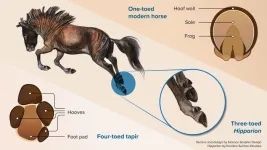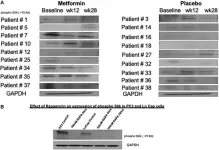(Press-News.org) Introducing widespread screening of newborns for a deadly disease called severe combined immunodeficiency, or SCID, followed by early treatment boosted the five-year survival rate of children with the disorder from 73% before the advent of screening to 87% since, researchers report. Among children whose disease was suspected because of newborn screening rather than illness or family history, 92.5% survived five years or more after treatment. These findings demonstrate for the first time that newborn screening facilitated the early identification of infants with SCID, leading to prompt treatment before life-threatening infections occurred and thereby increasing the proportion of children who survived to age 5 or beyond. Researchers at the National Institute of Allergy and Infectious Diseases (NIAID), part of the National Institutes of Health, and colleagues led the retrospective study, which The Lancet published today.
“This study definitively shows that population-wide newborn screening for SCID has made it possible to save the lives of many more children with the disorder than ever before,” said NIAID Acting Director Hugh Auchincloss, M.D. “We hope these findings will encourage more countries to screen newborns for this devastating disease.”
SCID is a rare disorder caused by mutations in genes involved in the development and function of infection-fighting immune cells. Infants with SCID appear healthy at birth but are highly susceptible to severe infections. The condition is fatal, usually within the first year or two of life, unless the infant receives an immune-restoring treatment such as a stem-cell transplant, gene therapy or enzyme therapy. Forty to 80 babies in the United States and Canada are diagnosed with SCID annually. The number of babies born with the disorder globally is unknown because most countries do not yet screen for SCID. Incidence ranges from 1 infant per 2,000 live births in regions where inbreeding is common to 1 per 60,000 live births where it is not.
NIH scientists developed a newborn screening test for SCID in 2005. The test’s gradual adoption has made it possible to detect the disease in infants before symptoms appear, take steps to prevent infection, and provide life-saving treatment early. Individual U.S. states and Canadian provinces began screening newborns for SCID in 2008, starting with a pilot program in Wisconsin. By the end of 2018, all U.S. states, Washington, D.C., and two U.S. territories were performing newborn screening for the disorder. Seven Canadian provinces and territories currently do so.
Several studies previously suggested that population-wide newborn screening for SCID improved survival, but none proved it. For this reason, the NIH-funded Primary Immune Deficiency Treatment Consortium (PIDTC) set out to definitively measure whether the advent of population-wide newborn screening for SCID had improved the overall survival of infants with the disease. The PIDTC is part of NCATS’ Rare Diseases Clinical Research Network and consists of 47 centers in North America with the shared goal of improving health outcomes of people with rare, life threatening, inherited disorders of the immune system.
PIDTC investigators analyzed data on more than 900 children with confirmed SCID who received treatment for the condition with a transplant of blood-forming stem cells from a non-genetically matched donor at one of 34 sites in the United States or Canada between 1982 and 2018. The researchers examined the five-year overall survival rate of these children from 2010¬–2018, when state- and province-wide newborn screening was in effect at participating sites, compared to earlier time periods. The researchers excluded infants who received stem-cell transplants from genetically matched sibling donors from the analysis, because these children had high overall survival rates throughout the study period.
The five-year overall survival rate for children with SCID who received a stem-cell transplant from a non-genetically matched donor remained steady at 72% to 73% from 1982 to 2009 despite advances in clinical care, then increased to 87% during the years 2010 to 2018. Among children whose disease was first suspected based on the result of newborn screening rather than on illness or family history of SCID, and who received a transplant between 2010 and 2018, 92.5% survived to age 5 or beyond.
Previous research had shown that being younger than 3.5 months at the time of transplant and not having an active infection at that time improved five-year survival rates for children with SCID. An analysis of the PIDTC data demonstrated that both these factors were much more common in the era of newborn screening and drove the increase in the proportion of children who survived to age 5. In addition, in 2010–2018 compared to previous decades, the percentage of babies with SCID who had never had an infection by the time of transplant was dramatically higher, further fueling the survival increase. Moreover, regardless of the transplant technique used, the percentage of children who survived to age 5 was highest in 2010–2018 compared to earlier decades.
NIAID and NIH’s National Center for Advancing Translational Sciences funded the study with additional support from NIH’s National Institute of Neurological Disorders and Stroke; National Heart, Lung, and Blood Institute; and National Cancer Institute.
Luigi Notarangelo, M.D., Christopher Dvorak, M.D., Elie Haddad, M.D., Ph.D., and Monica Thakar, M.D., led the study. Dr. Notarangelo is chief of the NIAID Laboratory of Clinical Immunology and Microbiology. Dr. Dvorak is chief of the Pediatric Allergy, Immunology and Bone Marrow Transplantation Division and director of the Pediatric Cellular Therapy Laboratory at University of California San Francisco (UCSF). Dr. Haddad is the associate chair of research and a professor in the Department of Pediatrics at the University of Montreal, as well as the head of the Immunology, Rheumatology and Allergy Division at CHU Sainte-Justine in Montreal. He also holds the Bank of Montreal chair of pediatric immunology at CHU Sainte-Justine. Dr. Thakar is the medical director of Bone Marrow Transplantation Inpatient Services at Seattle Children’s Hospital, as well as an associate professor at both Fred Hutchinson Cancer Center and University of Washington in Seattle.
Reference: MS Thakar et al. Measuring the effect of newborn screening on survival after haematopoietic cell transplantation for severe combined immunodeficiency: a 36-year longitudinal study from the Primary Immune Deficiency Treatment Consortium. The Lancet DOI:10.1016/S0140-6736(23)00731-6 (2023).
NIAID conducts and supports research—at NIH, throughout the United States, and worldwide—to study the causes of infectious and immune-mediated diseases, and to develop better means of preventing, diagnosing and treating these illnesses. News releases, fact sheets and other NIAID-related materials are available on the NIAID website.
About the National Institutes of Health (NIH): NIH, the nation's medical research agency, includes 27 Institutes and Centers and is a component of the U.S. Department of Health and Human Services. NIH is the primary federal agency conducting and supporting basic, clinical, and translational medical research, and is investigating the causes, treatments, and cures for both common and rare diseases. For more information about NIH and its programs, visit https://www.nih.gov/.
NIH...Turning Discovery Into Health®
END
The sustainability and scalability of limited duration interventions in low- and middle-income countries remain unclear. A study published in The Lancet Global Health aimed to investigate the sustainability in reduction of blood pressure (BP) through a 12-month lifestyle intervention by community health workers (CHWs) to reduce BP in Nepal four years after the intervention ceased.
During the 12-month intervention, female community health volunteers (FCHVs) visited participants in the intervention groups and provided lifestyle counselling and BP measurement every 4 months.
At the end of the 12-month intervention, ...
Exposure to air pollution meant an average of around four extra days in hospital for Covid-19 patients, further increasing the burden on health care systems, according to a study published today (Wednesday) in the European Respiratory Journal [1].
The researchers say the effect of pollution on patients’ time in hospital was equivalent to being a decade older. Conversely, the effect of reducing exposure to pollution was 40 to 80% as effective in reducing patients’ time in hospital as some of the best available treatments.
In ...
The distant ancestors of modern horses had hooved toes instead of a single hoof, which vanished over time, according to researchers.
The animals, such as the Eocene Hyracotherium, had feet like those of a modern tapir: four toes in front and three behind, each individually hooved with an underlying foot pad.
In contrast, modern equids such as horses, asses, and zebras, have only a single toe, the left over original third toe on each foot, encased in a thick-walled keratinous hoof, with an underlying triangular frog on the sole that acts as a shock absorber.
An international ...
Critical insights into why airborne viruses lose their infectivity have been uncovered by scientists at the University of Bristol. The findings, published in the Journal of the Royal Society Interface today [21 June], reveal how cleaner air kills the virus significantly quicker and why opening a window may be more important than originally thought. The research could shape future mitigation strategies for new viruses.
In the first study to measure differences in airborne stability of different variants of SARS-CoV-2 in inhalable particles, ...
Pupils in the UK are not learning about potentially life-changing issues such as endometriosis, infertility, and miscarriage, according to a new study of curricula in science and in relationships and sex education.
Researchers from University College London (UCL) looked at what schools are expected to teach 14–18-year-olds across the UK, using curriculum requirements and specifications set by exam boards. Findings, published today in the peer-reviewed journal Human Fertility, demonstrate significant gaps and variations in what pupils are taught ...
Hidden beneath the waves of coastal waters lies an important member of the marine food chain – seagrasses. These marine meadows are in many ways the unsung heroes of the ocean, benefiting humans and the planet by producing oxygen, removing carbon dioxide from the air, and providing food and habitat for marine life. But these submerged savannahs may be in danger of disappearing, according to a new Stanford study that modeled the distribution of seagrass species around the world at two different timepoints in the future.
Climate change is expected to hit marine species hard, in part because oceans absorb an estimated ...
Growing up, Brian Kisida always enjoyed going to school. He especially enjoyed the broad spectrum of subjects he was able to explore, including the arts. Now, as an assistant professor in the Truman School of Government and Public Affairs at the University of Missouri, he is researching the relationship between arts education and student success.
Over the years, Kisida, an expert on education policy, has seen the culture of education shift dramatically.
“I saw the impact that the test obsessed culture had on schooling, students’ mental health and enjoyment of learning,” Kisida said. “I wanted to know why we were seeing these changes that seem to not be in line ...
“The development of Precious1GPT [...] has demonstrated the potential of our approach in deciphering the molecular mechanisms of aging.”
BUFFALO, NY- June 20, 2023 – A new research paper was published in Aging (listed by MEDLINE/PubMed as "Aging (Albany NY)" and "Aging-US" by Web of Science) Volume 15, Issue 11, entitled, “Precious1GPT: multimodal transformer-based transfer learning for aging clock development and feature importance analysis for aging and age-related disease target discovery.”
Aging is a complex ...
“[...] we found no impact of the addition of metformin to [androgen deprivation] therapy on risk of metabolic syndrome associated with castration therapy and no additional anti-tumor effects.”
BUFFALO, NY- June 20, 2023 – A new research paper was published in Oncotarget's Volume 14 on June 19, 2023, entitled, “Utilizing metformin to prevent metabolic syndrome due to androgen deprivation therapy (ADT): a randomized phase II study of metformin in non-diabetic men initiating ADT for advanced prostate cancer.”
Androgen deprivation therapy (ADT) can lead to metabolic syndrome (MS) and is implicated in ADT-resistance. Metformin showed antineoplastic ...
Recent U.S. elections have raised the question of whether “microtargeting,” the use of extensive online data to tailor persuasive messages to voters, has altered the playing field of politics.
Now, a newly-published study led by MIT scholars finds that while targeting is effective in some political contexts, the “micro” part of things may not be the game-changing tool some have assumed.
“In a traditional messaging context where you have one issue you’re trying ...






